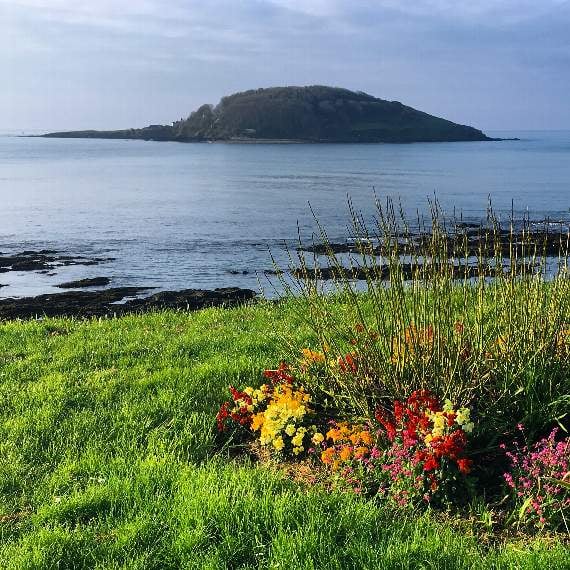TECHNOLOGY being used by Cornish museums will enable people to step back in time and see things through the eyes of their ancestors.
Coastal Time Tripping is a completely new and unique way to travel across Cornwall and the Isles of Scilly.
Incorporating cutting edge, immersive technology experiences, these new location-specific adventures allow travellers to ‘move through time’, experiencing the dramatic and vivid past in our advanced modern day.
You’ll be able to tread in the footsteps of a pilgrim in the 12th century on Looe Island, take the wheel of a 1900s Ketch in Bude, or experience the hustle and bustle of St Agnes’ busy harbour in the mining heyday.
Launched by Cornwall Museums Partnership, Falmouth University and Cornwall and the Isles of Scilly Local Enterprise Partnership, and funded by the Coastal Communities Fund, the adventures launch in Bude, Porthcurno and the Isles of Scilly on Monday (17th May), in Looe at the Old Guildhall Museum on June 7 and in St Agnes on June 21.
‘Coastal Timetrippers’ will be able to step into the recommended routes and experiences to unwrap new understandings of the people, the lives and the stories of the ones who existed and have gone before us.
In Looe, a 3D topographical map of Looe Island will be enhanced by iPads provided at the Old Guildhall Museum and Gaol. These devices utilise augmented reality to transport visitors to the early 1100s where they follow in the footsteps of the imagined journey of a monk and a pilgrim, walking across Looe Island as it was then.
At The Castle in Bude, there’s the chance to don a Virtual Reality headset and, quite literally, take the wheel of a 1900s ‘Ketch’. Timetrippers who step into this experience will find themselves transported back over 100 years, navigating the treacherous, wild sea, rocks and breakwater, and hopefully sailing the ‘Ceres’ safely into the Bude Canal, using an actual ship’s wheel.
In the ‘wild west’ at Porthcurno, an app allows adventurers the chance to physically traverse the valley, the beach and the grounds of the PK Porthcurno – Museum of Global Communications, concurrently traversing time periods from the Victorian era to the modern day. Layered sets of info, archival photographs, and content arise, all deepening the participant’s understanding of the valley’s historically significant place in global telecommunications.
At St Agnes Museum, on the central part of the North coast, VR headset technology brings not just the harbour itself to life, but also the life and bustle of the port in the heyday mining days of the early 1900s, now marked with the Cornish Mining World Heritage Site status.
On the Isles of Scilly, an app affords an incredible experience which brings a host of shipwrecks alive on mobile phones. This new Coastal Timetripping walking experience allows adventurers to traverse the five inhabited islands; St Mary’s, Tresco, St Martin’s, St Agnes and Bryher, providing a chance to see and feel the compelling heritage of the places in a way that has never been possible before.
Check out an introduction to the experience here: https://www.youtube.com/watch?v=hXxSUj-UyLM
The new online travelogue (www.coastaltimetripping.com) and accompanying Instagram feed (@coastaltimetripping) provides in-depth information on all five places and immersive experiences, acting simultaneously as a guide to the museum locations as well as connecting the history, heritage and landscapes in between. Extensive hints, tips and recommendations regarding the best places to stay, wine, dine, hang out and explore in each location is also available, as well as suggestions of other relevant places to stop on journeys between the spots.
There’s also an accompanying Coastal Timetripping playlist on Spotify, featuring a selection of musicians and bands who are either from Cornwall, or have connections to the area.
Cornwall Museums Partnership, working with Cornwall and the Isles of Scilly Local Enterprise Partnership, have collaborated with the Games Academy team at Falmouth University to create the five world-class immersive Coastal Timetripping experiences, in partnership with the experienced museums teams and curators at each location. The programme is financed by the Coastal Communities Fund.
Amy Shakespeare, Innovation Manager at Cornwall Museums Partnership says, “Cornwall has such a layered and intriguing past, and our small museums are incredible ‘gatekeepers’ of the stories of the people, the events and the surroundings. With Coastal Timetripping we have ‘matchmade’ our talented local museum teams with the cutting-edge immersive technology creators at Falmouth University. This collaboration, and the five Coastal Timetripping immersive experiences, opens up a whole new way for visitors and locals alike to step back and forward through time in Cornwall and on the Isles of Scilly bringing a new way of exploring today, whilst embracing the intriguing reality of yesterday.”
Amy continues, “Our accompanying online Coastal Timetripping travelogue and social media streams have been created to inspire, and to provide insights and advice from a group of Cornish locals, in each of the museum locations. Using the website, residents and visitors alike, of all ages, can plan a journey around the experiences, and by way of that timetripping adventure, open, discover, and make the most of some of the hidden aspects of the special and enchanted land.”
All five experiences will be available for access and use by Summer 2021 with Porthcurno, the Isles of Scilly and Bude opening on May 17th, Looe opening up June 7th and St Agnes opening on June 21st. Coastal Timetripping’s advice is for people to use www.coastaltimetripping.com and the connected social media streams to start planning their adventure now. Doing so now will mean that when it is possible to visit Cornwall and the Isles of Scilly, they can take their own adventure at their own pace, using any kind of vehicle or mode of transport. All five technological experiences have been designed to be used by individuals or ‘bubbles’ and using COVID-safe ‘Cleanboxes’, equipment will be safely sanitised between uses ensuring no modern-day contamination.




.jpg?width=209&height=140&crop=209:145,smart&quality=75)